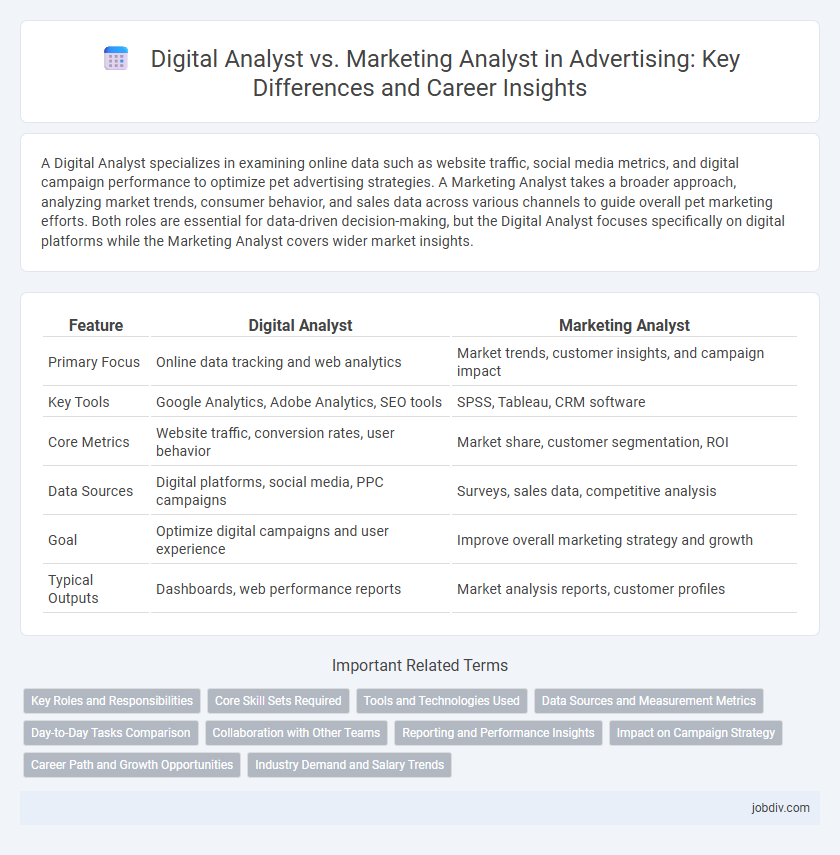A Digital Analyst specializes in examining online data such as website traffic, social media metrics, and digital campaign performance to optimize pet advertising strategies. A Marketing Analyst takes a broader approach, analyzing market trends, consumer behavior, and sales data across various channels to guide overall pet marketing efforts. Both roles are essential for data-driven decision-making, but the Digital Analyst focuses specifically on digital platforms while the Marketing Analyst covers wider market insights.
Table of Comparison
| Feature | Digital Analyst | Marketing Analyst |
|---|---|---|
| Primary Focus | Online data tracking and web analytics | Market trends, customer insights, and campaign impact |
| Key Tools | Google Analytics, Adobe Analytics, SEO tools | SPSS, Tableau, CRM software |
| Core Metrics | Website traffic, conversion rates, user behavior | Market share, customer segmentation, ROI |
| Data Sources | Digital platforms, social media, PPC campaigns | Surveys, sales data, competitive analysis |
| Goal | Optimize digital campaigns and user experience | Improve overall marketing strategy and growth |
| Typical Outputs | Dashboards, web performance reports | Market analysis reports, customer profiles |
Key Roles and Responsibilities
Digital Analysts specialize in analyzing online data from websites, social media, and digital campaigns to optimize user experience and drive targeted traffic. Marketing Analysts focus on broader market trends, consumer behavior, and competitive analysis to inform product positioning and promotional strategies. Both roles require strong data interpretation skills, but Digital Analysts prioritize web analytics tools like Google Analytics, while Marketing Analysts utilize market research and segmentation techniques.
Core Skill Sets Required
Digital Analysts require expertise in web analytics platforms such as Google Analytics and Adobe Analytics, along with skills in data visualization tools like Tableau or Power BI to interpret user behavior and campaign performance. Marketing Analysts need strong knowledge of market research methodologies, statistical analysis using software like SPSS or SAS, and proficiency in customer segmentation and competitive analysis to inform strategic marketing decisions. Both roles demand analytical thinking, data interpretation, and proficiency in Excel, but Digital Analysts emphasize digital channel optimization while Marketing Analysts focus on broader market trends and consumer insights.
Tools and Technologies Used
Digital Analysts primarily utilize web analytics platforms like Google Analytics, Adobe Analytics, and data visualization tools such as Tableau to track online user behavior and campaign performance. Marketing Analysts often leverage Customer Relationship Management (CRM) systems like Salesforce, marketing automation software like HubSpot, and competitive analysis tools to assess market trends and consumer insights. Both roles emphasize proficiency in Excel and SQL for data manipulation, but Digital Analysts focus more on digital touchpoint tracking technologies, while Marketing Analysts integrate broader market data sources.
Data Sources and Measurement Metrics
Digital Analysts primarily leverage web analytics platforms, social media metrics, and customer interaction data to track online behavior and campaign performance, focusing on real-time metrics such as click-through rates, bounce rates, and conversion funnels. Marketing Analysts utilize a broader array of data sources including market research, sales data, customer surveys, and CRM systems to evaluate overall marketing effectiveness, emphasizing metrics like ROI, customer acquisition cost, and market share. Both roles require proficiency in data interpretation but differ in their scope of data sources and measurement focus, with Digital Analysts concentrated on digital touchpoints and Marketing Analysts covering comprehensive marketing activities.
Day-to-Day Tasks Comparison
Digital Analysts primarily focus on analyzing online campaign metrics, tracking website traffic, and optimizing digital channels using tools like Google Analytics and SEMrush. Marketing Analysts evaluate broader marketing data, including market trends, customer behavior, and ROI across various campaigns by leveraging CRM systems and market research platforms. Both roles require data interpretation skills, but Digital Analysts concentrate on digital performance, whereas Marketing Analysts provide insights for overall marketing strategy development.
Collaboration with Other Teams
Digital Analysts collaborate closely with IT and data engineering teams to ensure accurate data collection and integration, enabling precise measurement of campaign performance. Marketing Analysts work alongside sales, product development, and creative teams to translate data insights into actionable marketing strategies that drive customer engagement. Both roles require seamless communication and teamwork to align analytics with business objectives and optimize advertising outcomes.
Reporting and Performance Insights
Digital Analysts specialize in tracking and interpreting web analytics, conversion rates, and user behavior to optimize online campaigns, while Marketing Analysts focus on broader market trends, customer segmentation, and competitive analysis. In terms of reporting, Digital Analysts generate detailed performance dashboards using tools like Google Analytics and Adobe Analytics, emphasizing real-time digital engagement metrics. Marketing Analysts provide strategic insights through market research reports and marketing mix models, linking advertising efforts to overall business objectives and ROI.
Impact on Campaign Strategy
Digital analysts leverage data from online channels to optimize real-time campaign performance, driving precise audience targeting and budget allocation. Marketing analysts assess broader market trends and customer insights to shape overall campaign messaging and product positioning. Combining both roles enhances campaign strategy by aligning digital tactics with comprehensive market understanding, maximizing ROI and engagement.
Career Path and Growth Opportunities
Digital analysts specialize in analyzing online data, focusing on metrics like website traffic, conversion rates, and social media performance, offering career growth through roles in data science and digital strategy. Marketing analysts evaluate broader market trends, customer behavior, and campaign effectiveness, with advancement opportunities in market research management and strategic planning. Both careers provide strong growth potential, but digital analysts often have an edge in tech-driven industries due to their expertise in digital tools and platforms.
Industry Demand and Salary Trends
Digital Analysts command higher salaries than Marketing Analysts due to growing demand for expertise in data-driven platforms like Google Analytics, SEO, and social media metrics within the advertising industry. Marketing Analysts remain essential for strategic insight but face a plateau in salary growth as automation and AI tools streamline traditional market research tasks. Industry projections highlight a 12% annual increase in demand for Digital Analysts, outpacing the 5% growth rate attributed to Marketing Analysts, influencing compensation trends accordingly.
Digital Analyst vs Marketing Analyst Infographic

 jobdiv.com
jobdiv.com